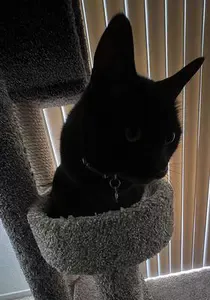Cat urinates on the same place on the bed
by Mark
(Canada)
Our cat, Shady, a rescued kitty we have had for two years, has started peeing on our bed and always in the same location.
We have washed the bedding endless numbers of times, sprayed water and vinegar solutions and even resorted to placing a tarp over the covers. Nothing works!
She does not urinate anywhere else, and this is becoming frustrating as we truly do love her. Help!!!!!
My Thoughts:
In the absence of any life change or stress on your cat (the hard part is figuring that out), I would suspect a urinary tract infection may be the cause here, but here's a bit more detail...
These types of problems can be quite difficult to solve. The first step would be to determine if it's marking behavior, or urination.
Marking behavior often involves backing up to a spot (usually something vertical like the headboard or wall), tail-up (possibly quivering), and releasing a relatively small volume of urine. Not all cats are quite this expressive, however, and it can be hard to judge.
If she squats and releases a fair amount of urine, it's more likely urination and not marking. She may, however, have a medical problem that only allows her to release small amounts of urine at a time, so be aware that small volumes of urine alone don't tell the whole story.
Returning to the same spot is a common behavior, so I don't think that really tells us anything. Vinegar may work to remove the odor on hard surfaces, or for recent incidents or small amounts of urine.
If the urine has soaked into the mattress, however, an enzyme-based cleaner is a better idea.
Does she use the litter box to urinate at all, or is she only using the bed? If she has stopped using the box entirely, I would certainly suspect a urinary tract infection or some other illness or bladder problem requiring medical attention.
If you see any blood in the urine at all, it's probably a UTI and definitely time for the vet. This can be hard to spot unless it's obvious.
If she's using the litter box and using the bed, she may still have an infection (or other physical problem), or she may by responding to a stress trigger.
As I've discussed throughout this section of the site,
Life changes (for a cat) may include the addition or removal of a family member in the house (including other animals), moving to a new location, a change in the litter box or litter, a new location for a litter box, a change in diet, and so on.
Any home remodeling? Removal or addition of furniture?
Some cats may even be stressed by a visit from a stranger or a stray cat at outside the window. The effects of the stress can last long after the trigger is gone.
You can try either aluminum foil on the spot, an upside down rug (if it has a backing - cats often don't like the backing on rugs), or a repellent device like X-mat.
What I would do, however, is temporarily restrict access to the bed or the room itself (whichever you can manage) until you get a handle on things.
So, we need to know:
Any obvious blood in the urine? Does she cry out when urinating or attempting to urinate? Does she seem to strain at all?
Does she go into the box, move around a bit, and then leave without urinating? Does she go near the box or walk around the house looking agitated?
These can all be signs that she's having pain associated with urination. There are ways to check for possible UTI by checking the pH of the urine.
Any recent life changes at all? Is another pet or household member aggravating her at all? One of our readers found out that one of her kids was using a water bottle to punish her cat. The cat was so stressed it turned into a litter box problem.
Other people have had pet ambush stories where litter box guarding was involved, and still others have had problems when the family started gathering in the room where the litter box is. You can't always see everything or know what triggers your cat's stress.
I hope that helps. Isolation retraining is always an option if there are no medical problems (or after they're cleared up).
It should work on an otherwise well adjusted cat. Please let us know what's happening with her and if she's showing any of the signs above.
-Kurt

